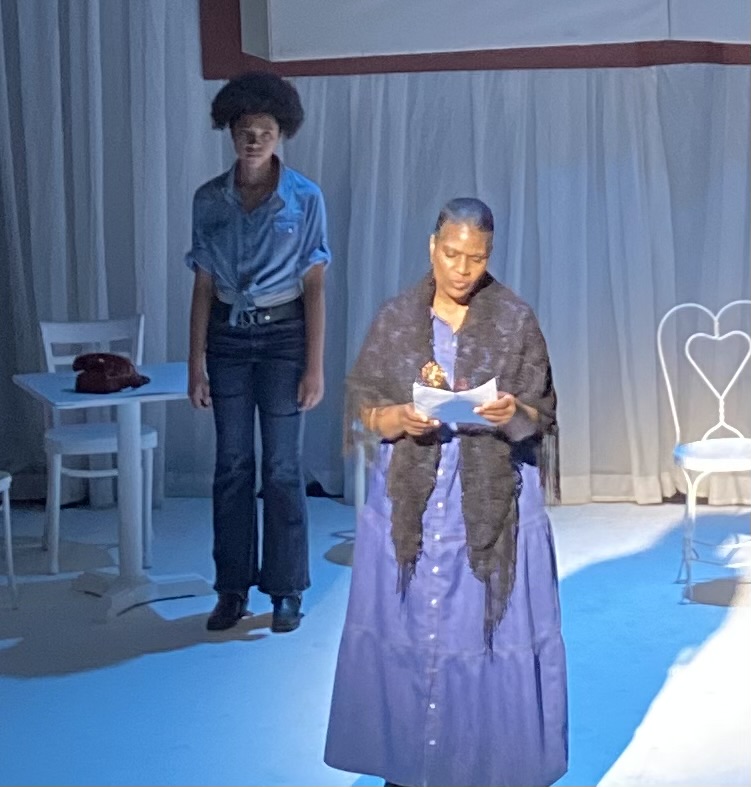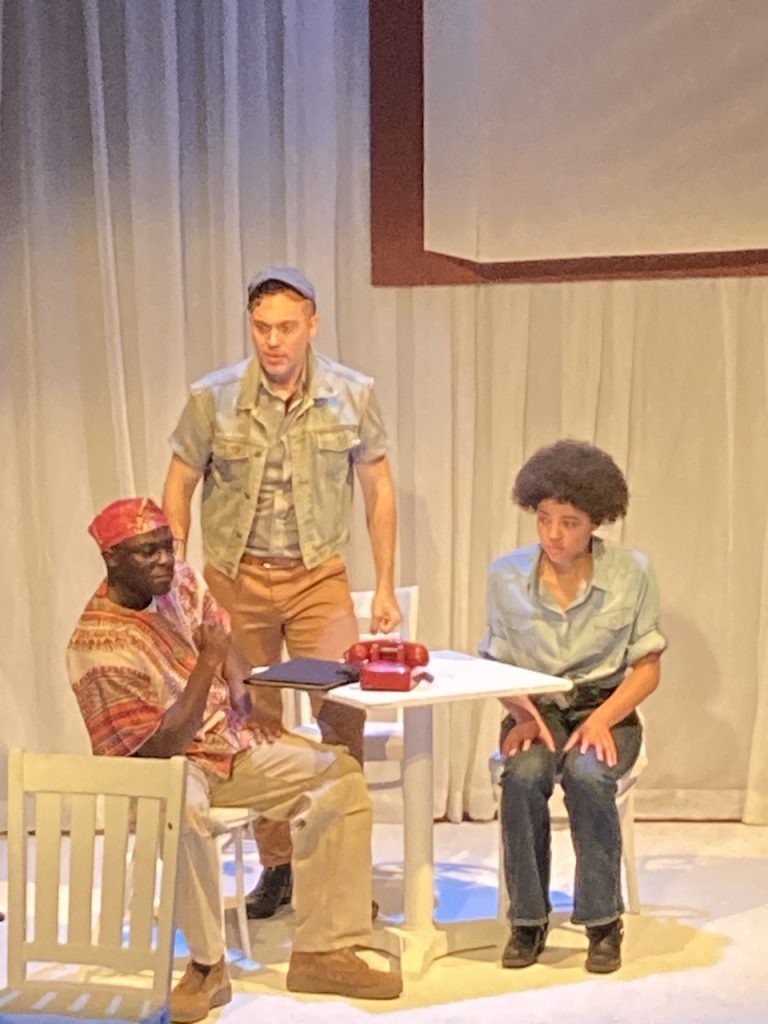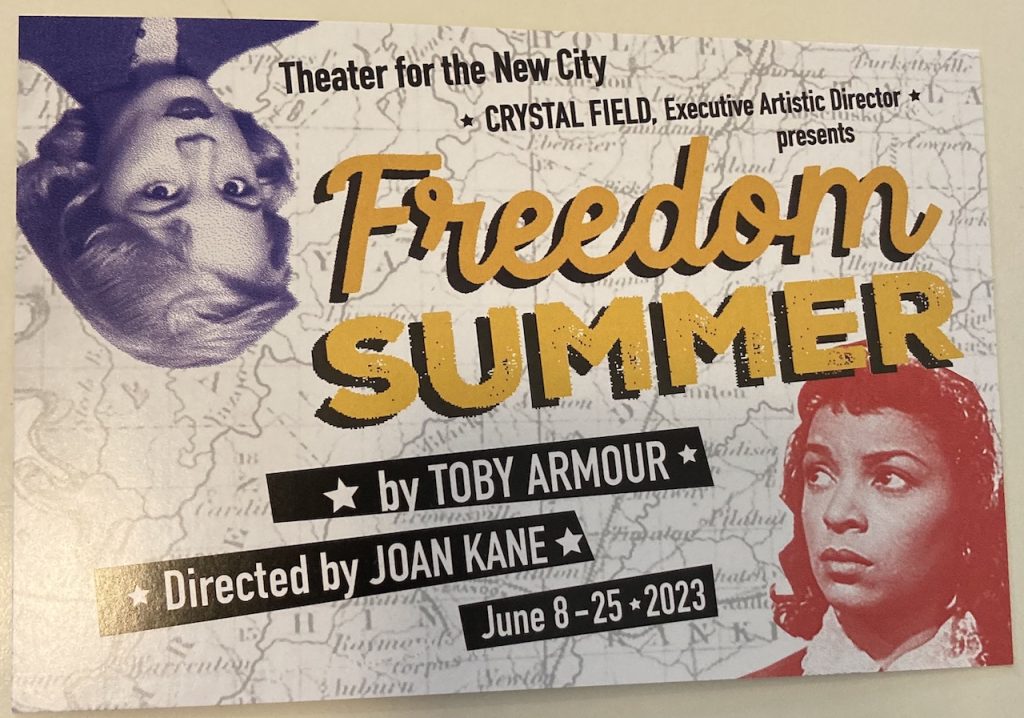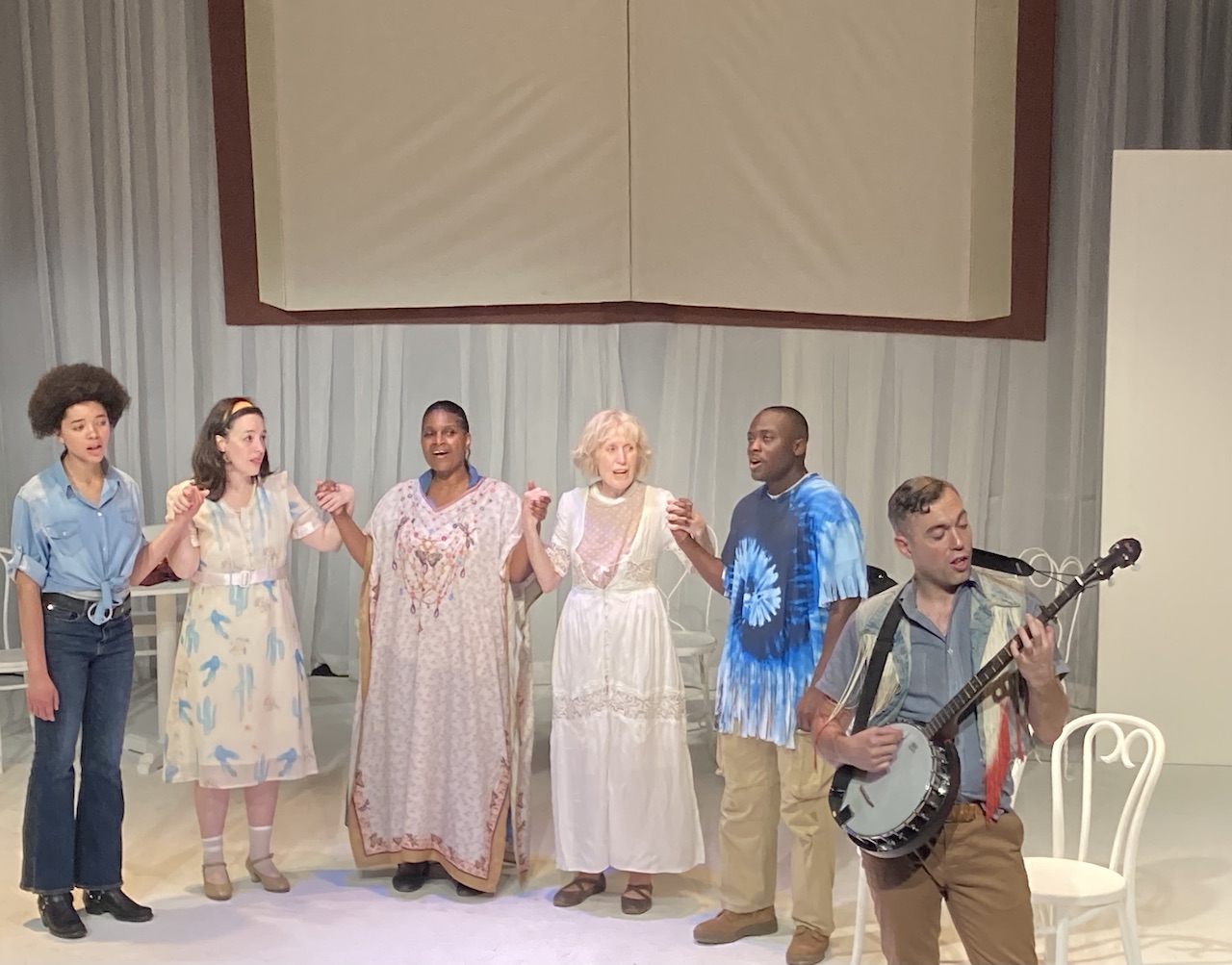BY CLAUDE SOLNIK | Martin Luther King famously said, “The time is always right to do the right thing.” For Toby Armour, 1964 was an important time to do the right thing. A graduate student at Brandeis, Armour traveled to Mississippi to register Black voters. She rented a car, registered voters door to door (not as many as she hoped), (wo)manned phones, faced fear, indifference, injustice and even found a resolution by the Mississippi Senate that sought to oppose and rid the country not just of J.F.K., but the entire Kennedy “dynasty.”
J.F.K. would be assassinated a year later almost to the day. Her discovery would end up as the footnote in a report. Toby Armour headed back north after having registered a precious few voters. But she brought back experiences and memories that are the foundation for a powerful play she wrote titled “Freedom Summer.”
Playing at Theater for the New City through June 25, “Freedom Summer,” effortlessly (although making things look effortless takes a lot of work) directed by Joan Kane with a strong cast, set and lighting, chronicles a very real account of Armour’s experiences, as well as those fictionalized but inspired by a Black volunteer from the South. It takes us into SNCC (Student Nonviolent Coordinating Committee) headquarters that we are told are located on “Lynch Street.” We get a cinematic account of the 1964 Freedom Summer project, designed to register Black voters in the South and put the spotlight on oppression in Mississippi.
The play couldn’t be more timely, since it comes as the U.S. Supreme Court ruled against gerrymandering in Alabama that the court concluded sought to reduce Black voters’ power. The production, which begins with photographs of the 1960s, ends with photographs of recent years, showing images from “I Can’t Vote” to “I Can’t Breathe,” revealing individuals and institutions haven’t changed as much as many would like, if at all.

“Freedom Summer” portrays Mississippi in the ’60s pervaded by fear for those engaged in this crucial crusade. This isn’t South Africa, but there are shades of it. Was Separate But Equal an American apartheid? When Sylvie (Clara Francesca), based on Armour, travels to the South, she is followed by state troopers. They don’t need to threaten her, but only stop her to inspire fear. She soon finds herself at a phone helping organize, where she is told what to do in case of emergency, terrified she will make a mistake.
As she knocks on doors, she finds some Black residents are more interested in just about anything, even learning French, than voting. Or at least that’s what they tell her, possibly not trusting her. Fear and intimidation are alive and well, but so is courage.
The production showcases a strong cast under the able direction (I couldn’t resist that pun) of Joan Kane. Arianne Banda as Terry, a Black Southerner, and Clara Francesca as Sylvie (based on Armour) each do a good job navigating their own, although largely separate but related, stories. Banda is idealistic, yet realistic, forceful but fragile with a “Peace” logo on her belt. Francesca’s Sylvie exists in almost perpetual panic, fighting fear and yet always moving forward. They are two profiles in courage, two strong women. Clarence Comfort in his many roles captures different characters, leading SNCC and so much more. Tim Dietrich seems like he stepped out of “The Heat of the Night” as a cop and then transitions well to a SNCC leader. Beth Griffith, in her many roles from worried and sometimes oblivious mother to famous figures, mixes comic relief with drama. Debra Khan-Bey gives a heart-wrenching portrayal/performance as Terry’s mother, trying to protect her daughter and herself, even telling the KKK her daughter died. Her delivery of a speech by Fannie Lou Hamer is a centerpiece that should get at least some people (yes, I’m one of them!) Googling Hamer’s name.
Smoothly staged and directed by Kane, the show glides cinematically from short scene to short scene, balancing two stories. The use of a small cast to create a big world paints history with a broad brush without a big cast. Starting the show with white chairs piled up gives us a sense of chaos. Positioning the cast, at the start, in the audience reminds us they are us and we are, or should be, them. There is a beautiful set by Mark Mercante and Lytza Colón, a white box from a white world, including a huge book used to project images, as if to show this is history, but the images are current and continuing.

(Congress of Racial Equality) headquarters talking with the CORE workers.
Alexander Bartenierff’s lighting is bright and hot, as if showing sunlight sanitizes, while evoking the stifling summer heat. He shines a strong spotlight on the story. Billy Little’s costumes reflect and revive the time, helping create characters with quick costume changes. Joy Linscheid’s sound design brings back chaos and calm, and Jim Marlowe’s projections add to the cinematic feel through true time travel.
The cast’s moments of song also fine-tune the feelings of the time. As I watched, I kept thinking about the recent Supreme Court decision in favor of rights for Black voters in Alabama. The bigger issue may be the same fight continues in a straight line from the ’60s and before. The history book has not, like the book in the show, closed. Literacy tests have been replaced by gerrymandering, and efforts to “challenge” voters continue based on signatures and refusing to count votes. The Supreme Court in 2013 gutted the Voting Rights Act as Shelby County v. Holder opened the door to voter suppression.

“Freedom Summer” has my vote as a play worth seeing, rife with history, memory and lessons as it tells two parallel stories set in one time. The show might have been even more powerful if it focused more on the two volunteers’ relationship, but their parallel journeys are worth following. The signs saying “Silence is Violence” are from recent protests. What have we learned? M.L.K. was right. It is always the right time to do the right thing. The saddest thing may be that some people continue to fight so hard to do the wrong thing.
“Freedom Summer” remains an important and timely reminder that things haven’t changed as much as they should and the struggle to vote and have your vote counted continues. The 1960s and some of the struggles that defined them aren’t nearly as far away as one might think they should be. I gave the show a standing ovation, but at least part of it was for Toby Armour, the Black volunteers and so many others who helped inspire the script.
“Freedom Summer,” through Sun., June 25, at Theater for the New City, 155 First Ave. (E. 10th St.), Thurs.-Sat. at 8 p.m., Sun. at 3 p.m. $18 / $15 seniors and students, 212-254-1109, www.theaterforthenewcity.net


Be First to Comment